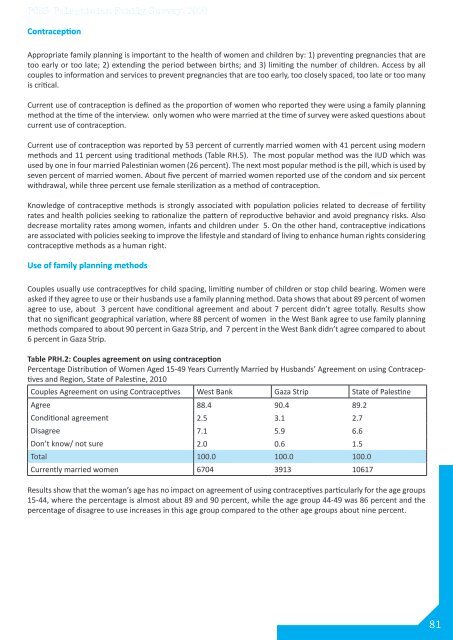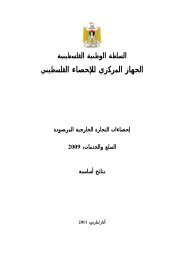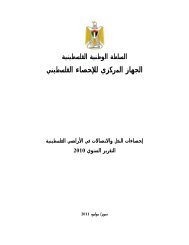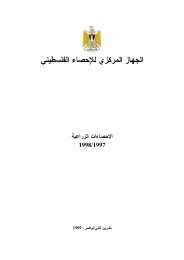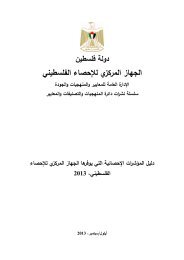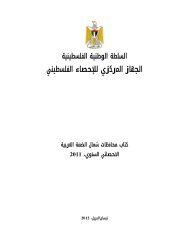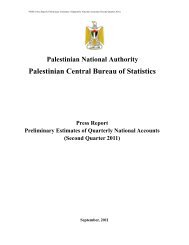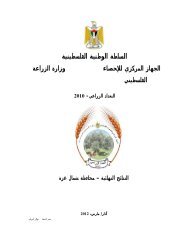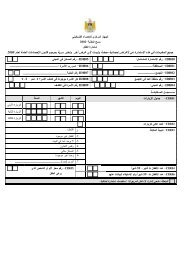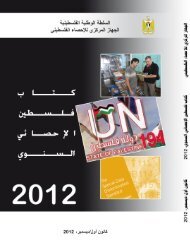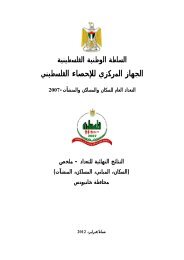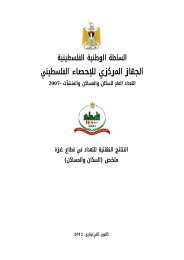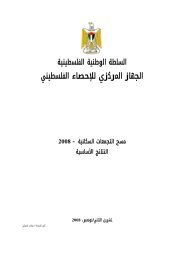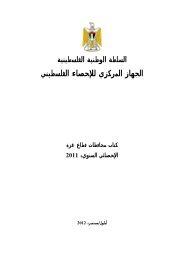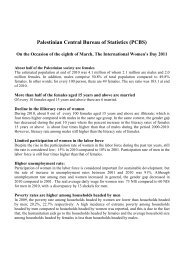- Page 1 and 2:
PalestineMonitoringthesituationofch
- Page 3 and 4:
PCBS: Palestinian Family Survey, 20
- Page 5 and 6:
PCBS: Palestinian Family Survey, 20
- Page 7:
PCBS: Palestinian Family Survey, 20
- Page 11:
PCBS: Palestinian Family Survey, 20
- Page 16 and 17:
PCBS: Palestinian Family Survey, 20
- Page 18 and 19:
PCBS: Palestinian Family Survey, 20
- Page 20 and 21:
PCBS: Palestinian Family Survey, 20
- Page 22 and 23:
PCBS: Palestinian Family Survey, 20
- Page 25 and 26:
PCBS: Palestinian Family Survey, 20
- Page 27 and 28:
4PCBS: Palestinian Family Survey, 2
- Page 29 and 30:
6PCBS: Palestinian Family Survey, 2
- Page 31 and 32:
PCBS: Palestinian Family Survey, 20
- Page 33 and 34:
PCBS: Palestinian Family Survey, 20
- Page 35 and 36:
PCBS: Palestinian Family Survey, 20
- Page 37 and 38:
PCBS: Palestinian Family Survey, 20
- Page 39 and 40:
16PCBS: Palestinian Family Survey,
- Page 41 and 42:
PCBS: Palestinian Family Survey, 20
- Page 43 and 44:
PCBS: Palestinian Family Survey, 20
- Page 45 and 46:
PCBS: Palestinian Family Survey, 20
- Page 47 and 48:
PCBS: Palestinian Family Survey, 20
- Page 49 and 50:
PCBS: Palestinian Family Survey, 20
- Page 51 and 52:
PCBS: Palestinian Family Survey, 20
- Page 53 and 54: PCBS: Palestinian Family Survey, 20
- Page 55 and 56: PCBS: Palestinian Family Survey, 20
- Page 57 and 58: PCBS: Palestinian Family Survey, 20
- Page 59 and 60: PCBS: Palestinian Family Survey, 20
- Page 61 and 62: PCBS: Palestinian Family Survey, 20
- Page 63 and 64: PCBS: Palestinian Family Survey, 20
- Page 65 and 66: PCBS: Palestinian Family Survey, 20
- Page 67 and 68: PCBS: Palestinian Family Survey, 20
- Page 69 and 70: PCBS: Palestinian Family Survey, 20
- Page 71 and 72: 48PCBS: Palestinian Family Survey,
- Page 73 and 74: PCBS: Palestinian Family Survey, 20
- Page 75 and 76: PCBS: Palestinian Family Survey, 20
- Page 77 and 78: PCBS: Palestinian Family Survey, 20
- Page 79 and 80: PCBS: Palestinian Family Survey, 20
- Page 81 and 82: PCBS: Palestinian Family Survey, 20
- Page 83 and 84: PCBS: Palestinian Family Survey, 20
- Page 85 and 86: PCBS: Palestinian Family Survey, 20
- Page 87 and 88: PCBS: Palestinian Family Survey, 20
- Page 89 and 90: PCBS: Palestinian Family Survey, 20
- Page 91 and 92: PCBS: Palestinian Family Survey, 20
- Page 93 and 94: PCBS: Palestinian Family Survey, 20
- Page 95 and 96: PCBS: Palestinian Family Survey, 20
- Page 97 and 98: PCBS: Palestinian Family Survey, 20
- Page 99 and 100: PCBS: Palestinian Family Survey, 20
- Page 101 and 102: 78PCBS: Palestinian Family Survey,
- Page 103: PCBS: Palestinian Family Survey, 20
- Page 107 and 108: PCBS: Palestinian Family Survey, 20
- Page 109 and 110: PCBS: Palestinian Family Survey, 20
- Page 111 and 112: PCBS: Palestinian Family Survey, 20
- Page 113 and 114: PCBS: Palestinian Family Survey, 20
- Page 115 and 116: PCBS: Palestinian Family Survey, 20
- Page 117 and 118: 94PCBS: Palestinian Family Survey,
- Page 119 and 120: PCBS: Palestinian Family Survey, 20
- Page 121 and 122: PCBS: Palestinian Family Survey, 20
- Page 123 and 124: PCBS: Palestinian Family Survey, 20
- Page 125 and 126: PCBS: Palestinian Family Survey, 20
- Page 127 and 128: PCBS: Palestinian Family Survey, 20
- Page 129 and 130: PCBS: Palestinian Family Survey, 20
- Page 131 and 132: PCBS: Palestinian Family Survey, 20
- Page 133 and 134: PCBS: Palestinian Family Survey, 20
- Page 135 and 136: PCBS: Palestinian Family Survey, 20
- Page 137 and 138: 114PCBS: Palestinian Family Survey,
- Page 139 and 140: PCBS: Palestinian Family Survey, 20
- Page 141 and 142: PCBS: Palestinian Family Survey, 20
- Page 143 and 144: PCBS: Palestinian Family Survey, 20
- Page 145 and 146: PCBS: Palestinian Family Survey, 20
- Page 147 and 148: PCBS: Palestinian Family Survey, 20
- Page 149 and 150: 126PCBS: Palestinian Family Survey,
- Page 151 and 152: PCBS: Palestinian Family Survey, 20
- Page 153 and 154: PCBS: Palestinian Family Survey, 20
- Page 155 and 156:
PCBS: Palestinian Family Survey, 20
- Page 157 and 158:
PCBS: Palestinian Family Survey, 20
- Page 159 and 160:
PCBS: Palestinian Family Survey, 20
- Page 161 and 162:
PCBS: Palestinian Family Survey, 20
- Page 163 and 164:
PCBS: Palestinian Family Survey, 20
- Page 165 and 166:
142PCBS: Palestinian Family Survey,
- Page 167 and 168:
PCBS: Palestinian Family Survey, 20
- Page 169 and 170:
PCBS: Palestinian Family Survey, 20
- Page 171 and 172:
PCBS: Palestinian Family Survey, 20
- Page 173 and 174:
PCBS: Palestinian Family Survey, 20
- Page 175 and 176:
PCBS: Palestinian Family Survey, 20
- Page 177 and 178:
154PCBS: Palestinian Family Survey,
- Page 179 and 180:
PCBS: Palestinian Family Survey, 20
- Page 181 and 182:
PCBS: Palestinian Family Survey, 20
- Page 183 and 184:
160PCBS: Palestinian Family Survey,
- Page 185 and 186:
PCBS: Palestinian Family Survey, 20
- Page 187 and 188:
PCBS: Palestinian Family Survey, 20
- Page 189 and 190:
166PCBS: Palestinian Family Survey,
- Page 191 and 192:
PCBS: Palestinian Family Survey, 20
- Page 193 and 194:
PCBS: Palestinian Family Survey, 20
- Page 195 and 196:
PCBS: Palestinian Family Survey, 20
- Page 197 and 198:
PCBS: Palestinian Family Survey, 20
- Page 199 and 200:
PCBS: Palestinian Family Survey, 20
- Page 201 and 202:
PCBS: Palestinian Family Survey, 20
- Page 203 and 204:
PCBS: Palestinian Family Survey, 20
- Page 205 and 206:
PCBS: Palestinian Family Survey, 20
- Page 207 and 208:
PCBS: Palestinian Family Survey, 20
- Page 209 and 210:
PCBS: Palestinian Family Survey, 20
- Page 211 and 212:
PCBS: Palestinian Family Survey, 20
- Page 213 and 214:
PCBS: Palestinian Family Survey, 20
- Page 215 and 216:
PCBS: Palestinian Family Survey, 20
- Page 217 and 218:
PCBS: Palestinian Family Survey, 20
- Page 219 and 220:
PCBS: Palestinian Family Survey, 20
- Page 221 and 222:
PCBS: Palestinian Family Survey, 20
- Page 223 and 224:
PCBS: Palestinian Family Survey, 20
- Page 225 and 226:
PCBS: Palestinian Family Survey, 20
- Page 227 and 228:
PCBS: Palestinian Family Survey, 20
- Page 229 and 230:
PCBS: Palestinian Family Survey, 20
- Page 231 and 232:
PCBS: Palestinian Family Survey, 20
- Page 233 and 234:
PCBS: Palestinian Family Survey, 20
- Page 235 and 236:
PCBS: Palestinian Family Survey, 20
- Page 237 and 238:
PCBS: Palestinian Family Survey, 20
- Page 239 and 240:
PCBS: Palestinian Family Survey, 20
- Page 241 and 242:
PCBS: Palestinian Family Survey, 20
- Page 243 and 244:
PCBS: Palestinian Family Survey, 20
- Page 245 and 246:
PCBS: Palestinian Family Survey, 20
- Page 247 and 248:
PCBS: Palestinian Family Survey, 20
- Page 249 and 250:
PCBS: Palestinian Family Survey, 20
- Page 251 and 252:
PCBS: Palestinian Family Survey, 20
- Page 253 and 254:
PCBS: Palestinian Family Survey, 20
- Page 255 and 256:
PCBS: Palestinian Family Survey, 20
- Page 257 and 258:
PCBS: Palestinian Family Survey, 20
- Page 259 and 260:
PCBS: Palestinian Family Survey, 20
- Page 261 and 262:
PCBS: Palestinian Family Survey, 20
- Page 263 and 264:
PCBS: Palestinian Family Survey, 20
- Page 265 and 266:
PCBS: Palestinian Family Survey, 20
- Page 267 and 268:
PCBS: Palestinian Family Survey, 20
- Page 269 and 270:
PCBS: Palestinian Family Survey, 20
- Page 271 and 272:
PCBS: Palestinian Family Survey, 20
- Page 273 and 274:
PCBS: Palestinian Family Survey, 20
- Page 275 and 276:
PCBS: Palestinian Family Survey, 20
- Page 277 and 278:
PCBS: Palestinian Family Survey, 20
- Page 279 and 280:
PCBS: Palestinian Family Survey, 20
- Page 281 and 282:
PCBS: Palestinian Family Survey, 20
- Page 283 and 284:
PCBS: Palestinian Family Survey, 20
- Page 285 and 286:
PCBS: Palestinian Family Survey, 20
- Page 287 and 288:
PCBS: Palestinian Family Survey, 20
- Page 289 and 290:
PCBS: Palestinian Family Survey, 20
- Page 291 and 292:
PCBS: Palestinian Family Survey, 20
- Page 293 and 294:
PCBS: Palestinian Family Survey, 20
- Page 295 and 296:
PCBS: Palestinian Family Survey, 20
- Page 297 and 298:
PCBS: Palestinian Family Survey, 20
- Page 299 and 300:
PCBS: Palestinian Family Survey, 20
- Page 301 and 302:
PCBS: Palestinian Family Survey, 20
- Page 303:
PCBS: Palestinian Family Survey, 20


